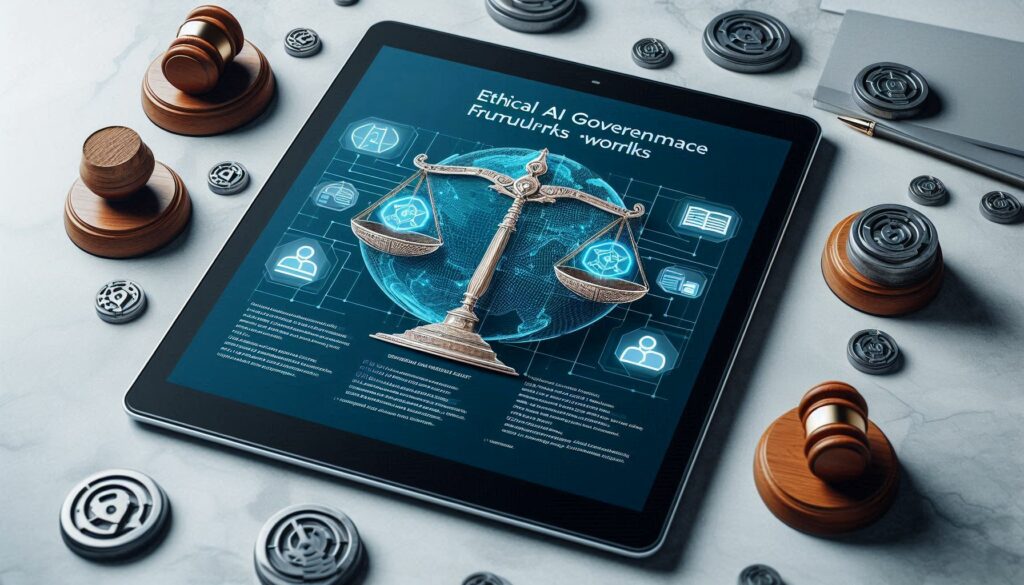
AI CERTS
7 months ago
Become an AI Government Expert Empowering Future Governance
Artificial Intelligence (AI) is reshaping industries worldwide, and governments are still catching up in leveraging its potential. From efficient public service delivery to proactive policymaking, AI enables governments to become more agile, transparent, and responsive. As the adoption of AI increases in the public sector, the need for professionals with both technical expertise and an understanding of governance frameworks is multiplying. These individuals, often called AI government experts, are driving innovation by implementing AI technologies that address public administration challenges.

In this article, we explore the journey to becoming an AI government expert, the essential skills required, the certifications to pursue, and the career opportunities available in this exciting field.
What Is an AI Government Expert?
An AI government expert specializes in applying AI tools and frameworks to public sector challenges. They act as a bridge between technology and governance, ensuring AI solutions align with public policies and serve the best interests of society. Governments across the globe are adopting AI technologies to improve decision-making, resource management, and citizen services. As a result, professionals with the right blend of technical and policy expertise are highly sought after.
AI government experts play a crucial role in:
- Optimizing public services through automation.
- Developing data governance frameworks for AI solutions.
- Implementing AI ethics and compliance policies.
- Collaborating with policymakers and technical teams to build sustainable AI projects.
With AI becoming integral to government operations, professionals in this field have the opportunity to make significant contributions to society while shaping the future of governance.
Why Governments Need AI Experts
Governments are increasingly adopting AI technologies to solve complex administrative issues, ranging from public safety to infrastructure management. As these AI-powered systems expand, so does the demand for AI government experts. According to Gartner, by 2025, over 50% of public service organizations are expected to deploy AI technologies. However, the lack of qualified AI professionals familiar with government frameworks remains a challenge.
Governments need experts who can:
- Create AI frameworks aligned with public policies.
- Ensure transparency and fairness in AI-based decisions.
- Integrate AI systems into existing infrastructure while ensuring compliance with data privacy laws.
The growing demand for AI government experts has opened exciting career opportunities for those equipped with the right skills. Let’s explore the primary AI use cases in government next.
Real-World Applications of AI in Government
Governments worldwide are using AI to enhance efficiency and deliver better services to citizens. Here are some prominent areas where AI plays a critical role:
- Public Safety and Law Enforcement:
AI-powered predictive policing systems analyze historical crime data to predict and prevent crimes. Governments also use facial recognition technology to identify suspects and track criminals. - Smart City Management:
Smart cities leverage AI-driven traffic systems to manage congestion and reduce emissions. AI algorithms predict traffic patterns, optimize public transportation, and enhance waste management. - Healthcare and Public Health:
Governments use AI tools to monitor public health trends, predict disease outbreaks, and manage healthcare services. For example, AI helped track COVID-19 cases and predict infection surges. - Disaster Management and Climate Monitoring:
AI-powered models monitor environmental changes and help governments prepare for natural disasters like floods, hurricanes, and earthquakes. These systems provide early warnings and optimize disaster response strategies. - Citizen Services and Chatbots:
AI-driven chatbots assist citizens by answering common queries related to government services. These chatbots reduce administrative burden and ensure 24/7 availability of services.
Each of these applications demonstrates how AI can transform governance. However, the effective implementation of these systems depends on experts who understand both AI technologies and public sector requirements.
Essential Skills Required to Become an AI Government Expert
Becoming an AI government expert requires a combination of technical expertise and a thorough understanding of governance principles. Below are the core skills necessary for success:
1. Technical AI Proficiency:
- Expertise in machine learning, deep learning, and NLP (Natural Language Processing).
- Knowledge of AI platforms such as TensorFlow, PyTorch, and OpenAI models.
2. Data Analytics and Management Skills:
- Ability to analyze large datasets using tools like Python, R, and SQL.
- Experience with major big data platforms like Apache Spark and Hadoop.
3. Understanding Public Policies and Governance:
- Insight into government operations, public policy frameworks, and regulatory compliance.
- Capability to align AI projects with governance goals and societal needs.
4. Ethics and AI Governance Frameworks:
- Knowledge of ethical AI principles to ensure fairness, accountability, and transparency.
- Familiarity with AI bias mitigation techniques and responsible AI development.
5. Project Management and Leadership Skills:
- Experience leading large-scale AI projects and cross-functional teams.
- Ability to collaborate effectively with policymakers, data scientists, and technical experts.
With these skills, you can develop AI-powered solutions that not only optimize government functions but also contribute to the well-being of society.

Top Certifications to Become an AI Government Expert
Pursuing certifications is a great way to validate your expertise and build a competitive edge in the field. Here are some certifications that will help you become an AI government expert:
1. AI+ Government™ Certification
- Offered by: AI CERTs
- Description: This specialized certification equips public-sector professionals with the skills to integrate AI effectively in government operations. The course covers data management algorithms, AI governance frameworks, and strategies for ethical AI implementation. Through hands-on exercises and case studies, participants learn to design AI-driven solutions for policy, education, and public safety.
- Key Modules Include:
- AI Governance and Policy Frameworks
- AI for Public Safety and Security
- Data Management and AI-driven Citizen Services
- Outcome: Graduates will gain the expertise to align AI strategies with governmental goals, ensuring innovation, efficiency, and transparency.
- Target Audience: Policymakers, administrators, and public-sector professionals.
2. Leading in Artificial Intelligence: Exploring Technology and Policy
- Offered by: Harvard Kennedy School
- Program Focus: This executive education course empowers leaders with the tools needed to harness AI in public policy. Participants gain expertise in balancing technological advancements with public interests, tackling privacy issues, and developing AI-based policy solutions.
- Benefits:
- Understand AI-driven policy frameworks.
- Network with government officials and industry experts.
- Design ethical AI strategies for societal benefit.
- Ideal For: Senior officials, executives, and policymakers working at the intersection of technology and public policy.
3. AI for Decision Making Program
- Offered by: The Alan Turing Institute
- Program Overview: This course focuses on how to apply AI and data science tools to enhance decision-making in both public and private sectors. Participants learn to work with large datasets, employ ethical decision-making frameworks, and develop automation solutions tailored to public services.
- Key Modules:
- Data governance strategies for public services.
- AI algorithms for policy decision-making.
- Automation tools for administrative efficiency.
- Who Should Enroll: Professionals in the public sector, consultants, and managers seeking data-driven strategies for governance.
4. AI and Data Ethics Certification
- Offered by: MIT Sloan School of Management
- Description: Focused on responsible AI implementation, this certification covers governance models and compliance standards necessary for ethical AI development. The curriculum includes data privacy laws, bias mitigation strategies, and frameworks for inclusive AI systems.
- Course Highlights:
- Explore AI ethics through case studies.
- Gain insights into global regulatory frameworks.
- Learn to build fair and transparent AI solutions.
- Audience: Public officials, consultants, and managers overseeing AI integration in public services or businesses.
These certifications equip you with the knowledge and credentials needed to thrive as an AI government expert.
Career Opportunities for AI Government Experts
As governments expand their use of AI, several career paths are emerging in the field of AI-driven governance. Below are some of the most promising roles:
- AI Policy Analyst:
Develops AI policy frameworks and ensures regulatory compliance for government initiatives. - Smart City Consultant:
Works with urban planners to design AI-powered smart cities, enhancing sustainability and efficiency. - Chief Data Officer (CDO):
Oversees data governance and AI strategies for public sector organizations. - AI Project Manager:
Manages AI-driven initiatives across multiple government agencies, ensuring alignment with public policies. - AI Consultant for Public Services:
Advises government bodies on how to integrate AI solutions to optimize services and operations.
These roles not only offer job security but also provide opportunities to make a meaningful impact on society.
Benefits of Becoming an AI Government Expert
Becoming an AI government expert offers several advantages:
- High Demand and Job Security:
The growing reliance on AI in government ensures consistent demand for skilled professionals. - Global Career Opportunities:
Governments across the globe are adopting AI, creating opportunities for international collaboration. - Impactful Career Path:
Shape policies and improve public services through innovative AI solutions. - Continuous Learning:
Stay at the forefront of technological advancements with a career that encourages lifelong learning. - Interdisciplinary Experience:
Work across various domains, such as healthcare, transportation, and urban planning.

Conclusion: Shaping the Future of Governance
Becoming an AI government expert is a unique career path that combines technology with governance. As governments around the world continue to adopt AI, professionals with the right skills and certifications are well-positioned to lead this transformation. Whether it’s managing smart city projects, developing ethical AI frameworks, or optimizing citizen services, AI government experts play a pivotal role in shaping the future of governance.
Take the next step in your career by becoming an AI government expert. Visit AI CERTs and explore certifications designed to help you lead AI initiatives in governance. Get certified today and make an impact on the future of public services!
Here are our other articles you might be interested :